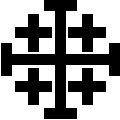The Sacramental Pentad
by Dionysos Thriambos
Do what thou wilt shall be the whole of the Law.

Do what thou wilt shall be the whole of the Law.
Jean Bricaud's Eglise Catholique Gnostique was the immediate predecessor of the Gnostic Catholic Church of O.T.O. In the rituals and doctrines that he outlined for that church, Bricaud advanced a system of five proprietary sacraments. These five together form a system of greater magical and doctrinal integrity than the set of seven sacraments developed by the Roman Church. Both the operations excluded and those included by the five-fold sacramental system can demonstrate the ritual implementation of Thelemic philosophy, as well as maintaining the dissenting position of neo-Gnosticism from Christian orthodoxy. The two functions excluded from the list of five sacraments are marriage and penance.
There is certainly an important place for marriage ceremonies in the Church, based on universal human needs, as well as on Crowley's indication in the communion section of "Liber XV." But that does not mean that we should view marriage as a proprietary sacrament in a category comparable to baptism or holy orders. As Bricaud writes, marriage is not a sacrament, "but there has always existed in the Church a nuptial benediction, which is a simple religious ceremony." This would put marriage ceremonies (as distinct from marriage itself) in a category of helpful services administered by the Church, such as memorial Masses or ceremonies of infant benediction.
If we look to the counter-traditions of dissent and heresy in Western Christian society, there are few more common features than protest against the Roman Church's insistence on proprietary control over the immemorial institution of marriage, an insistence that culminated in the codification of the seven sacraments. In reprisal to such protest, Rome often accused heretics of rejecting marriage conventions altogether. Functionally, our position is much more similar to those churches that reject the sacramental status of marriage than it is to that of the Roman Church. For Rome, couples married outside the Church aren't married "before God." Let our Church never presume to be the sole custodians of genuine marriage. To offer marriage as a sacrament managed after the Roman fashion would be a desertion of the neo-Gnostic counter-tradition, and would move towards a position seen by our predecessors as an expression of ecclesiastical tyranny.
The ninth collect helps to contextualize marriage ceremonies within Ecclesia Gnostica Catholica. That prayer addresses marriage in its most generic sense. It refers to all acts of union with love under will. Such acts could include "extramarital" sex, ceremonies of ordination, individual samadhi, or at its most generalized, any and all interactions of the individual and her environment. I consequently interpret that collect to refer to the "marriage of wisdom" as the characteristic gesture of human life, just as the "baptism of wisdom" refers to actual birth ("whereby we accomplish the miracle of incarnation"), rather than to the Church's proprietary sacrament of baptism, which merely symbolizes birth in the process of receiving catachumens into the Church.
As regards penance, some have suggested that a communal and ecclesiastical "confession of will" could substitute for "confession of sin" in rounding out a set of seven Thelemic sacraments. But it is my understanding that this "sacrament" has remained theoretical in the work of Ecclesia Gnostica Catholica. Such a ceremony would be clearly an innovation on the EGC instructions that we have received from Prophet and Past Patriarch Crowley.
These two operations of penance and marriage that I would exclude from the set of EGC sacraments are notable for being ceremonies that would ritually codify "will" and "love under will" respectively. As such, I would be leery of presenting them as regular (i.e. rule-bound) operations subordinate to the Church. Instead, I see those fundamental principles of the Law as being the generic operations to which the Church, and all institutions of Thelemic religion, must be naturally subject.
The remaining set of five sacraments are all clearly concerned with the Church's institutional participation in the life of the individual. Rather than the metaphysically perverse distinction between "natural" and "elective" sacraments (which presumes such "Gnostically incorrect" features as infant baptism), I would suggest that all five are of a single class. Yet the Eucharistic Mystery stands out as the first among equals, the spiritual operation that empowers and motivates the others.
| Sacrament | Magick Power | Element |
| Baptism | To Know | Water |
| Confirmation | To Will | Fire |
| Ordination | To Dare | Air |
| Unction | To Keep Silence | Earth |
| Mass | To Go | Spirit |
The set of five sacraments, as shown in the table above, can be attributed to the various key emblems of the pentad: the pentagram, the square-based pyramid, and the Jerusalem cross. If we were a Christian church, I might suggest their attribution to the five wounds, and to the letters of JHShVH. In the context of O.T.O., they may be seen as elements in the formula of AIQHR (The Book of Lies, cap. 86), and they may be attributed to the clauses of Priestess' injunction from CCXX I:63...
| Sing the rapturous love-song unto me! | Mass |
| Burn to me perfumes! | Confirmation |
| Wear to me jewels! | Ordination |
| Drink to me, | Baptism |
| for I love you! I love you! | Unction |
Love is the law, love under will.
Sacramental Theory & Practice
Vigorous Food & Divine Madness